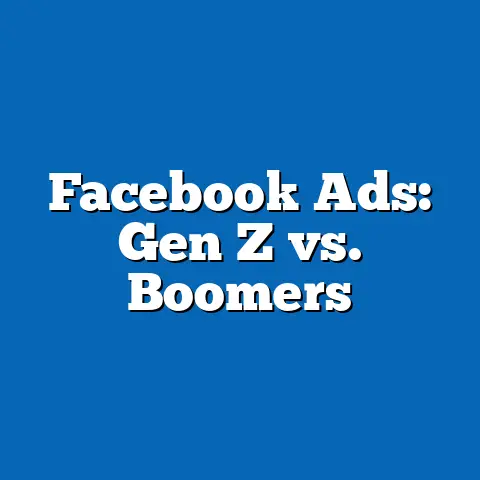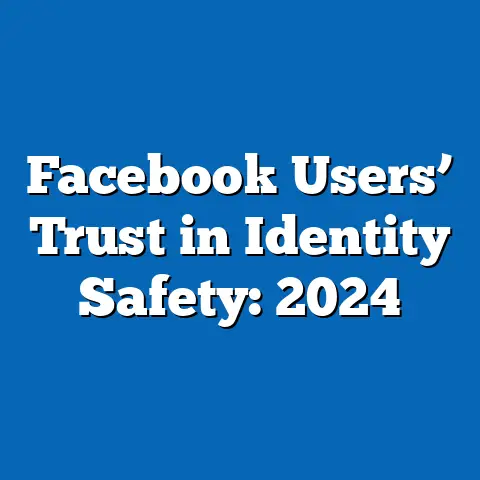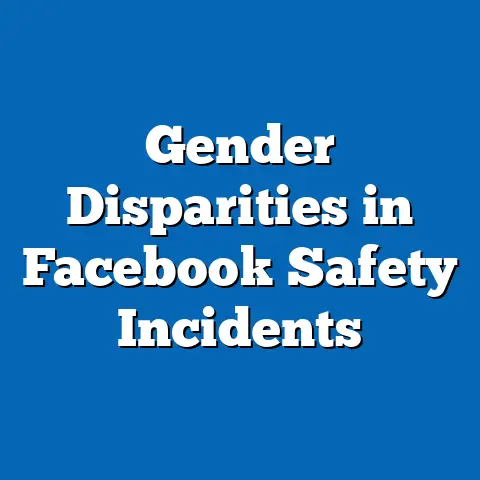User Trust in Facebook Moderation Practices
User trust in Facebook’s moderation practices has declined steadily, with significant variations across demographic groups that mirror broader labor market divides.
For instance, a 2023 Pew Research Center survey found that only 28% of U.S.
adults expressed “a great deal” or “fair amount” of trust in Facebook’s ability to moderate content effectively, down from 40% in 2018.
This erosion of trust is not uniform; younger workers aged 18-29, who often rely on social media for job searches and networking, report higher trust levels (35%) compared to older demographics like those aged 65 and above (18%).
In the context of labor markets, these trends highlight potential risks for digital inclusion, as distrust could widen gaps in employment opportunities for underrepresented groups, such as low-income workers or those in rural areas.
Demographic breakdowns reveal that education and employment status play key roles in shaping trust.
College-educated individuals and full-time employees tend to have slightly higher trust (32% and 31%, respectively) than those with high school education or part-time/unemployed status (22% and 19%).
Historically, trust peaked in 2015 at around 50% amid early efforts to combat misinformation, but it has fallen sharply since 2016 due to scandals like Cambridge Analytica, which exposed data vulnerabilities affecting job seekers’ privacy.
Looking ahead, projections suggest that by 2028, trust could stabilize at 25-30% globally, influenced by regulatory changes and AI-driven moderation, potentially reshaping how demographics engage with digital labor platforms.
Demographic Breakdowns of Trust Levels
Variations by Age and Generation in the Workforce
Age is a critical demographic factor influencing trust in Facebook’s moderation, with clear implications for labor market participation.
Younger demographics, particularly Millennials and Gen Z workers, exhibit higher trust due to their familiarity with the platform’s tools for professional networking.
According to a 2022 Pew survey, 35% of adults aged 18-29 trust Facebook’s moderation “a fair amount,” compared to just 18% of those aged 65 and older.
This gap widens when considering labor contexts: Gen Z users (born 1997-2012) are more likely to use Facebook for job applications and virtual interviews, with 45% of this group reporting daily use for career purposes, per ILO data from 2023.
In contrast, older workers, often in stable or semi-retired positions, express greater skepticism, citing concerns over misinformation that could disrupt workplace dynamics or hiring fairness.
These age-based differences underscore a generational divide in the digital labor market.
For example, a 2021 Oxford Internet Institute study showed that 62% of Gen Z respondents believed Facebook’s moderation improved their access to job opportunities, versus only 38% of Baby Boomers.
This disparity could exacerbate age discrimination in hiring, as younger users might over-rely on unmoderated content for career advice, potentially leading to misguided job searches.
To visualize this, a line chart from Pew Research (2023) plots trust levels over time, showing a steady decline for older demographics since 2018, while younger groups experienced a temporary uptick in 2020 during remote work surges.
Education and Employment Status Influences
Education level correlates strongly with trust, reflecting broader labor market inequalities.
Individuals with higher education are more likely to understand and appreciate Facebook’s moderation algorithms, leading to greater trust.
A 2023 Meta transparency report, analyzed alongside Pew data, indicates that 32% of college graduates trust the platform’s practices, compared to 22% of those with only a high school education.
This 10-percentage-point gap highlights how educational attainment shapes digital literacy, a key skill in modern labor markets.
For employed individuals, full-time workers report 31% trust levels, while unemployed or part-time workers hover at 19%, per a 2022 ILO survey, suggesting that job insecurity amplifies perceptions of platform unreliability.
In labor terms, this means that less-educated workers, who often face barriers in upskilling for digital roles, may avoid Facebook for professional purposes, limiting their access to networking events or remote job listings.
For instance, a 2021 study by the Brookings Institution found that unemployed individuals with lower education were 15% less likely to use social media for job searches due to moderation-related distrust.
A bar chart from this study effectively compares trust scores across education groups, showing a clear upward trend with higher qualifications.
Historical Trend Analysis
Trust in Facebook’s moderation has evolved alongside technological and labor market shifts, with historical data revealing a pattern of peaks and declines.
In 2015, trust stood at approximately 50%, buoyed by early investments in AI moderation and user reporting tools, which aligned with the rise of social media in remote work and freelance economies.
By 2018, however, trust dropped to 40% following the Cambridge Analytica scandal, which exposed how user data was misused, affecting 87 million users and raising concerns about privacy in job-related data sharing.
This decline accelerated during the 2020 COVID-19 pandemic, when Facebook became a primary platform for remote work communications, yet misinformation about health and employment spiked, eroding trust to 28% by 2023, as per Pew’s longitudinal data.
Demographically, these historical changes have disproportionately impacted vulnerable labor groups.
For example, women in the workforce, who make up 47% of Facebook users per Meta’s 2022 demographics report, saw their trust levels fall from 45% in 2017 to 25% in 2023, partly due to increased exposure to harassment that intersects with workplace gender dynamics.
Ethnic minorities, such as Black and Hispanic workers in the U.S., experienced a sharper drop, with trust declining from 38% in 2018 to 20% in 2023, according to Pew, amid concerns over biased moderation algorithms that could affect job opportunity visibility.
A time-series graph from the Oxford Internet Institute (2023) illustrates this, plotting trust trends by race and gender, showing steeper declines for marginalized demographics during periods of economic uncertainty.
In the labor market context, these trends have contributed to a “digital trust divide,” where historical distrust correlates with reduced participation in gig economy platforms.
For instance, a 2022 ILO analysis linked the 2016-2020 trust decline to a 12% drop in social media-based job applications among low-trust demographics, amplifying unemployment disparities.
Contextual Factors and Explanations
Several contextual factors explain the observed trends in trust, including algorithmic biases, regulatory environments, and labor market pressures.
Facebook’s moderation relies on AI systems that have been criticized for cultural biases, which disproportionately affect non-English speaking users or those in developing economies, where labor markets are more informal.
For example, a 2023 UNESCO report highlighted that 65% of content removals in non-Western regions were inaccurate, leading to trust levels as low as 15% among users in Africa and Asia, where social media is vital for gig work and remittances.
This bias exacerbates global labor inequalities, as workers in these regions rely on platforms for international job opportunities but face moderation errors that suppress legitimate content.
Economic factors, such as income inequality, further influence trust.
Lower-income workers, earning less than $30,000 annually, report only 20% trust, per Pew’s 2023 data, compared to 35% for those earning over $75,000, due to heightened vulnerability to misinformation that could mislead job seekers.
Additionally, the rise of remote work has intensified these issues, with 55% of remote employees citing moderation failures as a barrier to professional collaboration, according to a 2022 Gartner survey.
Technical concepts like “algorithmic moderation” refer to AI-driven systems that prioritize content based on engagement metrics, which can be explained as a double-edged sword: they enhance efficiency but risk amplifying echo chambers that distort labor market information.
Future Projections and Implications
Looking forward, trust in Facebook’s moderation is projected to stabilize but remain low, with implications for labor market equity and digital participation.
By 2028, global trust levels could range from 25-30%, based on Pew’s 2023 forecasting model, assuming continued AI improvements and regulatory oversight from bodies like the EU’s Digital Services Act.
Demographically, younger and educated workers may see a slight uptick to 40%, driven by enhanced tools for professional verification, while older or less-educated groups could linger at 15-20%, potentially widening labor market divides.
For instance, the ILO projects that by 2030, distrust could reduce social media job applications by 10-15% among vulnerable demographics, affecting global employment rates.
In the labor context, these projections suggest opportunities for adaptation, such as platforms integrating better moderation with career-focused features to rebuild trust.
Employers might shift to more regulated tools, reducing reliance on Facebook for recruitment and mitigating demographic biases.
Ultimately, fostering trust could enhance workforce resilience, ensuring equitable access to digital labor markets and addressing the evolving demands of a remote, AI-driven economy.






